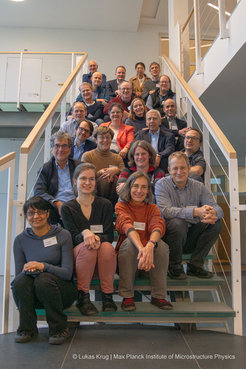Max Planck Institute is part of the new Cluster of Excellence with up to 64.5 million euros in funding
The “Center for Chiral Electronics”, Excellence Cluster in Materials Science, is a joint initiative of the Max Planck Institute of Microstructure Physics in Halle, Martin Luther University, the Freie Universtät Berlin and the University of Regensburg.

The German Research Foundation (DFG) is providing up to €64.5 million in funding for the Centre of Excellence ‘Center for Chiral Electronics’ (CCE), which was jointly proposed by Martin Luther University Halle-Wittenberg (MLU), Freie Universität Berlin, the University of Regensburg and the Max Planck Institute of Microstructure Physics (MPI) in Halle. The cluster will start in January 2026 and initially run for seven years. The research will focus on new concepts for high-performance, energy-efficient electronics.
"The approval of the Centre for Chiral Electronics is an outstanding success for Martin Luther University and also for Saxony-Anhalt. The funds will be invested in excellent research projects in materials science. We have consistently expanded this research focus in recent years, which has now been rewarded with this excellence funding. However, the university as a whole will also benefit from the funding and will be able to further enhance its reputation as an internationally renowned research institution. I would like to thank everyone involved who made this success possible," said MLU Rector Prof. Dr. Claudia Becker.
‘We did it! Saxony-Anhalt's scientific landscape finally has the official seal of approval “excellent”,’ says Science Minister Prof. Dr. Armin Willingmann, delighted with today's decision. "The success of the University of Halle in the current round of the Excellence Strategy is a great achievement, also for the entire federal state. We can hope for important impetus for research in the state and greater international attention for science in eastern Germany. The consistent and long-term support provided by the Ministry of Science has thus paid off. As of today, it is clear that Saxony-Anhalt is also capable of excellence.‘
’The funding provided under the Excellence Strategy is a fantastic success. The review panel has attested to the outstanding scientific quality of our cluster. We have a unique opportunity to break new ground in solid-state physics and lay the foundations for the next generation of electronics and storage technologies," says spokesperson Prof. Dr. Georg Woltersdorf from MLU. He submitted the application for the Cluster of Excellence together with Prof. Dr. Katharina Franke from Freie Universität Berlin and Prof. Dr. Christoph Strunk from the University of Regensburg.
The Centre for Chiral Electronics is a joint initiative of MLU, the Freie Universität Berlin, the University of Regensburg and the Max Planck Institute of Microstructure Physics in Halle. In its search for solutions for energy-efficient electronics, the CCE research team has taken inspiration from nature: chirality means that an object cannot be made to coincide with its mirror image by rotation and translation. This property gives many objects in nature a special stability against external disturbances. Until now, chirality has not played a role in electronics. The CCE team aims to develop new chiral materials and concepts for ultra-fast and efficient electronics. The four partner institutions involved each contribute different areas of expertise that complement each other perfectly: MLU and MPI have extensive expertise in research on chiral materials, while the Freie Universität focuses on ultra-fast spin dynamics and the University of Regensburg on coherent strong field control.
The CCE will train highly qualified physicists who can make important technological contributions to semiconductor technology. This is also happening against the backdrop of the European Chips Act, which aims to build up greater production capacities in this area in Germany and Europe. In collaboration with established education researchers, concepts will also be developed to get young people more interested in science at school – and thus possibly attract them to a career in research and development.
Text taken and translated into English from the press release of Martin Luther University Halle-Wittenberg (MLU)












